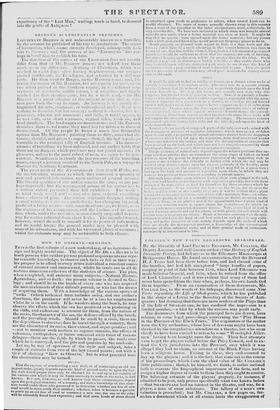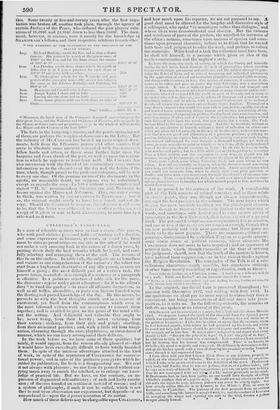COLLIER'S NEW FACTS REGARDING SHAKSPEARE.
By the liberality of Lord Faseicis Ens:m.0N, Mr. Cosies:a, the Deputy-Licenser, and well-known author of the History Qf English Dramatic Poetry, had full access to the Ellesmere Manuscripts at Bridgewater House. He found on examination, that the Reverend H. J. TODD had been there before him, and had classed some of the bundles, but had left unexplored " large bundles of papers, rangiug in point of date between 1381, when Lord Ellesmere was made Solicitor-General, and 1616, when he retired from the office of Lord Chancellor; and it was evident that Inany of them had never been opened from the time when, perhaps, his own hands tied them togethee.- From an examination of these documents, Mr. COLLIER has, in the words of his titlepage, discovered some New lints• regarding the Life of Shaltpeare, which he has published in the shape of a Letter to the Secretary of the Society of Anti- quaries; but deeming that there are more readers of the Plays than of the Life of SHAKSPEARE, he has confined the impression to a limited number,—a hint by which the curious may profit early.
The documents from which the principal facts are drawn, have relation to some legal proceedings concerning the "Play House in the Precinct of the Black Friers:' The originators of the matter were the City authorities, whose love of decorum might have been shocked by the irregularities attendant on a theatre, but who seem chiefly to have been excited to action by some "Worshipful Alder- men " having been brought upon the stage. Their first attempts e ere to get the players called before the Privy Council, and to ex- tend the City jurisdiction into the Precinct, over which it was alleged they had no claim, on account of the Black Friars having been a religious house. Failing in these, they endeavoured to buy up the players; and it is the facts that come out in the course of the preceedings, which form the chief value of Mr. COLLIER'S little publication ; though he himself, we think, is rather inclined both to overrate the biographical importance of the facts, and to assign a higher degree of credit to them than they ought to receive. The following estimate of the players' property, for instance, if admitted to be just, only proves specifically what was known before —that rfsitAKsPEARE had an interest in the theatre, and was, for a player, a man of sonic substance. The fallacy of a mans own valuation is proverbial ; but Mr. COLLIER, a few pages on, fur- nishes a document which at all events hints the exaggeration of this. Some twenty or five-and-twenty years after the first nego- tiation was broken off, another took place, through the agency of certain Justices of the Peace, who reduced the poor players valet. atious of 16,000/. and 21,9901. down to less than 3000/. The awn. went, however, is curious, were it merely for the knowledge of SUAKSPE ARE'S fellows, and their respective relations to each other " FOR AVOIDING OF THE PLAYHOUSE IN THE PRECINCT OF THE •
!MACKE FRIERS.
Imp. Richard Burbidge oweth the Fee, and is alsoe a sharer
therein. His interest he 'atm!' at the grosse hU11/0 of 1000 fir the Fee, and for his fume shares the suture of 1:1:J■ 6' I
hathat 9 & Item LIZ Fletcher oweth three slimes which he rateth at 700E, that is at 7 rates purchase for each share ur
:3:311 h1 one yea re with an ou her 70;0 Item W. Shake ante asheth for the Watittohe and pio- perties of the play home hilt at,' for his I shares, the same as his fellowes llorbidge and Fletcher, viz
9931' 6' ht
Item Ileminges Conde!! oche "..! shares
Item Joseph .Taylor 1 share and 11316! 93;oh Rent Lowing also one share and an halfe
Item Fume mote players with one laa!le slow to eche of
them 4661i 1!".`
totalis 6166. 1:3. 4.
" Moreover, the hired men of the COIllpanie demannd some re'compehse for their great losse, and the Widowes and ilbplianes of PI t)eres, who are [aide by the Sharers at diners rates and propm Lions, so as in the whole it will caste the Lo. Mayor and the Citizens at the least 714161," The facts in the fbregoinge-timate, and the points springing out of them, are perhaps the weightiest discoveries in the Letter. lint the industry of Mr. Co1.1.1Elt has hunted up more original docu- ments, both from the Ellesmere papers and other sutures, that serve to illustrate some minutia, connected with SitvicsoEvitE's fellow bards and actors, or throw seine further light upon the bargains and torus standi of the poet, as well as upon the estima- tion in which he appears to have been held. Mr. Coma E it has also interwoven with the thread of his commentary some curious information as to the ehorueby.c of the day awl the habits of the time, which, though patent to the profound antiquary, will be now to every one else. Of the genuine nature of the documents in the epistle, no reasonable doubt, we suppose, can be entertained, except as regards the copy if a letter Nvilllollt s.tperseriptinn and signed " II. S.- recommending t4u.katil'E.1 RE and Buns.1GE to favour against the Mayor and Aldermen. This, our writer seems to think, was written by KournAMPrON t9 Easassisaie: but it' so, the original surely to tau e 1,e,.!1 found, and not the copy. Should the cl eninent ho genuine, I lw i:tC rcticc w‘,11141, sent
to be, that the letter was aildresrd to titInT a copy of it given or sent to Lord ELLEi:.11:RE, to niece him by a side-wind as it were.
n.
6R



























 Previous page
Previous page